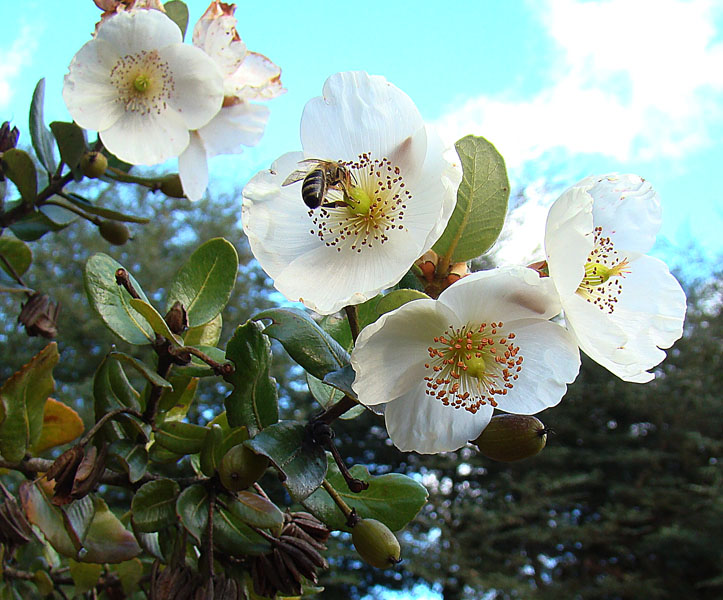Eucryphia cordifolia
Ulmo
Species Tolerances
- Drought Tolerance: Medium
- Shade Tolerance: Yes
- Waterlogging Tolerance: Low
- Frost Tolerance (trees from warmer climates may be frost tolerant, but their flowers may not be): Yes
- RHS Hardiness: H4
- Optimum Conditions for Growth:
A columnar, medium sized evergreen tree. Grows best in sheltered, moist and slightly acid loamy soils. It prefers an open site, e.g. woodland clearings, yet does not grow well if shaded out by other trees, but at the same time not a very open site, as it requires the protection of other trees from wind damage and it grows best if the roots are shaded and cool, but its leaves are in the sun. - Susceptibility to Pest/Disease:
No major pests or disease at present

Eucryphia cordifolia, S Chile/ Dick Culbert/ https://creativecommons.org/licenses/by/2.0/deed.en
Service to Pollinators
- Summary of Service to Pollinators:
A good source of pollen and nectar for winter stores for honeybees, and building up winter reserves for other bee species queens and other pollinators. Will produce much more nectar in a warmer climate. - Nectar Value to Pollinators: 3 (of 0-3)
- Honeydew Value to Pollinators: 0 (of 0-3)
- Pollen Value to Bees: 3 (of 0-3)
- Flowering Period: July-Aug
Risks
- Human Toxicity: Non-toxic
- Livestock Toxicity: Non-toxic
- Invasive Risk: No
- Suckering: No
Products
- Edible Fruit: No
- Edible Leaves: Insufficient Data
- Edible Sap: No
- Edible Seeds: Insufficient Data
- Honey, major source in UK: No
- For any medicinal potential, see 'Further Details' below.
- Timber: Yes
- Livestock Fodder: No
- Other Products:
Firewood and a potential use for timber, as used in Chile. As the climate warms has potential to produce honey as major source
Utility
- Nitrogen Fixation: No
- Organic Matter Accumulation: No
- Phytoremediation: Insufficient Data
- Deacidification: Insufficient Data
- Windbreak: No
- Soil Erosion Control: Yes
- Shade or Shelter: Yes
- Plant Support: Insufficient Data
- Integrated Pest Management: Insufficient Data
- Wildlife Value: Yes
- Wildlife Value Summary:
Low biodiversity value but service to pollinators - Graduated Nativeness Classification ⓘ: 9 (of 1-10)1. Historic Native
2. Historic Introduction
9. Neutral Introduction
Further Details
Adaptable to warmer climate, and will produce honey crops in a warmer climate from increased nectar production.